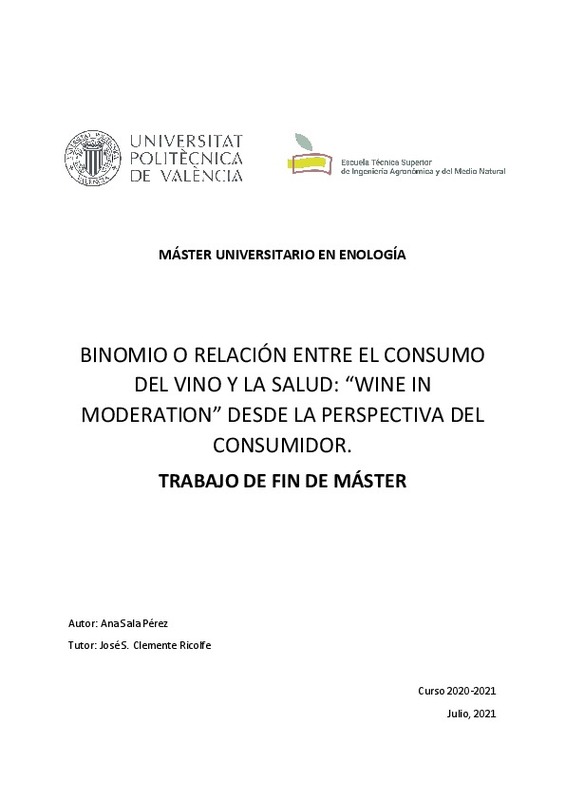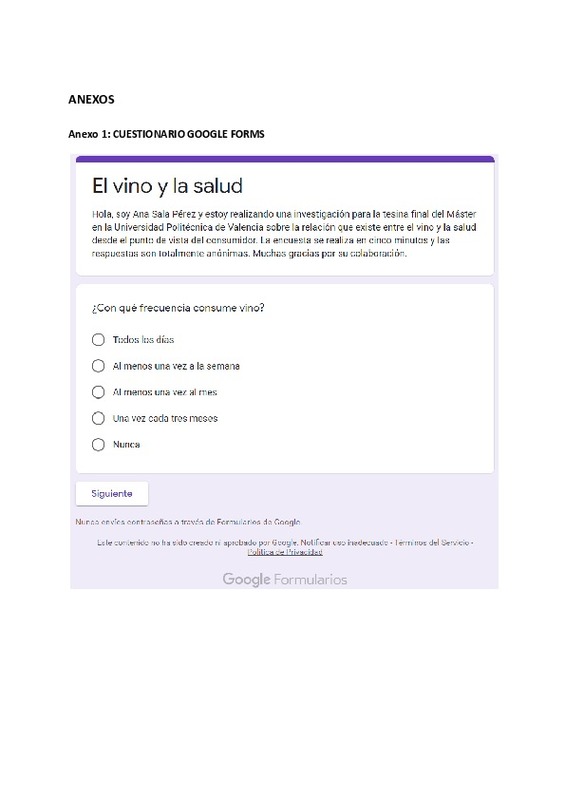JavaScript is disabled for your browser. Some features of this site may not work without it.
Buscar en RiuNet
Listar
Mi cuenta
Estadísticas
Ayuda RiuNet
Admin. UPV
Binomio o relación entre el consumo del vino y la salud: Wine in moderation desde la perspectiva del consumidor
Mostrar el registro sencillo del ítem
Ficheros en el ítem
| dc.contributor.advisor | Clemente Ricolfe, José Serafin
|
es_ES |
| dc.contributor.author | Sala Pérez, Ana
|
es_ES |
| dc.date.accessioned | 2021-09-29T17:51:15Z | |
| dc.date.available | 2021-09-29T17:51:15Z | |
| dc.date.created | 2021-09-10 | |
| dc.date.issued | 2021-09-29 | es_ES |
| dc.identifier.uri | http://hdl.handle.net/10251/173499 | |
| dc.description.abstract | [ES] En el presente trabajo se va a analizar la evidencia obtenida a día de hoy sobre la posible relación entre el consumo de vino y la salud humana y cuál es la información que posee la población acerca de ello, información sobre los patrones de consumo y sobre la información sobre las pautas y beneficios sobre un consumo moderado. La relación o binomio consumo de vino-salud sigue siendo un tema controvertido hoy en día y tiene a la comunidad científica dividida ya que a pesar de que muchos estudios in vitro e in vivo en animales demuestran que los compuestos no alcohólicos presentes en el vino tienen ciertos beneficios en la salud, estos resultados pueden ser diferentes al ser evaluados en personas debido a que interfieren otros muchos factores, como el estilo de vida, la nutrición, etc. También es debido a la presencia de alcohol y a los posibles efectos negativos asociados a su consumo, aunque también se destaca los efectos beneficiosos del mismo. Estos estudios indican que para conseguir los efectos beneficiosos del vino, éste se debe consumir de forma moderada. Mediante estudios poblacionales se ha determinado que la población en su mayoría no conoce la definición de consumo moderado ni los beneficios que esto conlleva, por lo que han surgido campañas y agrupaciones dedicadas a enseñar y concienciar sobre un consumo responsable de alcohol. A esto se dedica Wine in Moderation, una coalición de organizaciones que pretende concienciar sobre un consumo y una cultura sostenible del vino. Es objeto de este trabajo determinar el conocimiento que la población tiene y la importancia que le da a este tipo de organizaciones. Para ello se realizará una encuesta online en España, y con la información obtenida se harán las oportunas recomendaciones al sector. | es_ES |
| dc.description.abstract | [EN] In this work the evidence obtained up until now about the possible relationship between wine consumption and human health will be analyzed specifically. It is assessed the information that the population owns about that subject, information about consuming patterns and information about the guidelines and benefits of a moderate consumption. The relationship o binomial wine consumption – human health is still a matter of controversy nowadays. Even the scientific community has carried out many in vitro and in vivo studies to prove that the non-alcoholic compounds in the wine have benefits in the human health, those results may be different when evaluated in humans due to the interference of other factors, like life style or nutrition among the others. It is also due to the presence of alcohol and the possible adverse effects associated with its consumption. However, the potential benefits of its consumption are also highlighted. These studies indicate that for reaching the benefit from the effects of wine, it muts be consumed in a moderate way. That’s why organizations that works on teaching and raising awareness about responsible alcohol consumption has been created. This is what Wine in Moderation does, a coalition of organizations that pretend to raise awareness about sustainable consumption and the wine culture. Determinate the knowledge of the population about these organizations and the importance they give to them is the goal of this work. To achieve that knowledge it has been carried out a online survey at the Google Forms platform, on which it has been collected 245 surveys with an allocation proportional to the inhabitants of autonomous communities. For the data analysis it has been used a statistical programme called Dyane 4. The main results were that part of the population is confused about the relation between wine an human health and does not know the nutritional properties of wine, as well as the guidelines of a moderate consumption. It has also been seen that almost nobody has knowledge about initiatives like Wine in Moderation. | es_ES |
| dc.format.extent | 33 | es_ES |
| dc.language | Español | es_ES |
| dc.publisher | Universitat Politècnica de València | es_ES |
| dc.rights | Reserva de todos los derechos | es_ES |
| dc.subject | Vino | es_ES |
| dc.subject | Salud | es_ES |
| dc.subject | Wine in Moderation | es_ES |
| dc.subject | Alcohol | es_ES |
| dc.subject | Polifenoles | es_ES |
| dc.subject | Moderación | es_ES |
| dc.subject | Marketing | es_ES |
| dc.subject | Wine | es_ES |
| dc.subject | Health | es_ES |
| dc.subject | Poliphenols | es_ES |
| dc.subject | Resveratrol | es_ES |
| dc.subject | Moderation | es_ES |
| dc.subject.classification | ECONOMIA, SOCIOLOGIA Y POLITICA AGRARIA | es_ES |
| dc.subject.other | Máster Universitario en Enología-Màster Universitari en Enologia | es_ES |
| dc.title | Binomio o relación entre el consumo del vino y la salud: Wine in moderation desde la perspectiva del consumidor | es_ES |
| dc.type | Tesis de máster | es_ES |
| dc.rights.accessRights | Abierto | es_ES |
| dc.contributor.affiliation | Universitat Politècnica de València. Departamento de Economía y Ciencias Sociales - Departament d'Economia i Ciències Socials | es_ES |
| dc.contributor.affiliation | Universitat Politècnica de València. Escuela Técnica Superior de Ingeniería Agronómica y del Medio Natural - Escola Tècnica Superior d'Enginyeria Agronòmica i del Medi Natural | es_ES |
| dc.description.bibliographicCitation | Sala Pérez, A. (2021). Binomio o relación entre el consumo del vino y la salud: Wine in moderation desde la perspectiva del consumidor. Universitat Politècnica de València. http://hdl.handle.net/10251/173499 | es_ES |
| dc.description.accrualMethod | TFGM | es_ES |
| dc.relation.pasarela | TFGM\142845 | es_ES |
Este ítem aparece en la(s) siguiente(s) colección(ones)
-
ETSIAMN - Trabajos académicos [3541]
Escuela Técnica Superior de Ingeniería Agronómica y del Medio Natural







